- Home
- C. Robert Cargill
Dreams and Shadows Page 2
Dreams and Shadows Read online
Page 2
“Ewan is fine, Mrs. Thatcher. He’s a perfectly healthy baby boy.” He looked over at the changeling who lay perfectly still, smiling, growing evermore content with his mother’s rapidly mounting anxiety.
“I don’t understand,” she said, trembling. “When I brought him in he was screaming his head off. He’d been screaming for eight hours straight. He’s not all right.”
“Ma’am, look at him. Whatever was wrong seems to have passed. What’s happening is completely normal. It happens all the time. The stress of a new child . . .”
“I know what I saw,” she snapped. The doctor didn’t flinch.
“I know. I believe you. Which is why I’d like to prescribe something.”
Tiffany relaxed for a moment, allowing herself to believe that someone finally understood—but that confidence was eroded when the doctor called Jared into the office to join them. Postpartum. That wasn’t the scary word. Postpartum was fine. Psychosis was the word that almost broke her.
The first day was by far the easiest. Tiffany took her medication, spent the day cradling the baby, sitting in the handcrafted rocking chair bought for her by her proud in-laws. The gentle creak of the chair on the floor was a kind reassurance of better times.
Creak. Creak.
The baby was quiet all day. Not a peep. Jared wanted to say something, but he thought better of it. At least Tiffany was at peace, and completely bombed out of her mind on some lithium derivative that cost nearly a day’s pay.
Every so often she would examine the baby. No fangs. Blue eyes. Tiny, adorable fingers with a faultless collection of diminutive fingernails. Perfect.
But as dusk set in, the baby changed. His brow bent out of shape, bulging a little to one side. A lingering smell wafted in on the breeze. And as the sun crept below the horizon, the baby squinted his yellow eyes.
Tiffany jumped, dropping the changeling square on its head, and the wailing returned. Jared ran into the room, saw his son crying on the floor, his wife standing contemptuously over their child. He froze. Tiffany looked up at him, pointing a crooked finger at the abomination on the floor. “That’s not my baby!” she cried. “That’s not my baby!”
Each day became progressively worse. Soon she couldn’t go anywhere near the baby, not to feed him, not to touch him, not to so much as look at him. The crying only worsened, so bad Tiffany eventually retreated into her bedroom, spending hours at a time with a pillow clutched over her head, though it never entirely drowned out the sound. The howls became whispers and soon the whispers carried instructions.
She couldn’t talk to Jared anymore. What was she going to say? She couldn’t tell him what the baby wanted her to do; the creature was becoming something far worse than a mere imposter. There was only one thing that would satisfy it, one thing that would stop its wailing.
She wanted to beat it with a brick, to crush its tiny skull to pieces, wringing the life out of its monstrous little neck, to toss it off her seventeenth-story balcony and watch it sail down into the tree line below. Oh, she dreamed of many dark and devious things in the dead of her sleepless nights—such foul atrocities she dare not speak them aloud lest she lose Jared along with her remaining sanity. The drugs helped a little—kept her fuzzy, unable to hurt her baby—but they couldn’t keep out the whispers.
After a week and a half without taking so much as a few steps out the door, the fridge was bare, the cupboards gathering dust. They needed groceries. Jared sat beside his wife, put a hand on her shoulder and asked her if she would be okay. Surprisingly, she sat up, threw her arms around him, kissing him square on the mouth. And for the first time in over a week she smiled. Then she kissed him again, as deeply and passionately as she knew how.
“I’m feeling much better, actually,” she assured him. “Really. Go. Just don’t be long.”
Jared felt as if a fifty-pound weight had been lifted from his life and he strode happily off to the store. And as he returned home and unlocked the door, he heard the familiar creaking of Tiffany in her rocking chair. Normalcy at last. The door swung open, and inside, on the couch, sat the baby, cooing and smiling, happy as ever.
Creak. Creak. Creak. An overturned chair. Creak. Horn-rimmed glasses upturned and cracked on the floor. Creak. A trickle of blood at the side of her mouth. Creak. Images. Flashes. Not enough time to process. There she swung, the most beautiful woman in the world, a rough, blister-dealing rope wrapped around her delicate neck, and tied to a beam above her. Creak. Slender toes three feet off the ground. Creak. Lifeless eyes still open, begging for respite.
Creak. Jared fell to the ground beneath his wife. Reaching up, tears already streaming down his cheeks, he gently stroked her foot. Creak. He grabbed hold, steadying her, and as he looked over at his son, wondering what he was going to do without her, he caught a glimpse of a wicked smile and tapering eyes. The changeling giggled mischievously. With that, the sun buried its head behind the hills and there was the unmistakable sight of yellow and the shadow of a single jagged tooth.
At once Jared knew what his son had done. He knew what Tiffany had done. Most important, he knew what he had to do.
He rose to his feet, walked over, scooping the changeling into his arms, then methodically made his way down sixteen flights of stairs—the shrieking creature howling the whole way down. Both of them knew how this was going to play out. Jared lived but a block from the lake and he took his time, thinking only of Tiffany—not of the way he’d left her, swinging from the rafters, but the way she’d looked when he first saw her over that French book. He remembered her the way she had looked on that walk. The way she looked at their wedding. The way she looked when they first held Baby Ewan in their arms.
He remembered all the ways he saw her, including the time he saw her last, as he performed his slow and dastardly procession.
The block was quieter than usual, with no one so much as jogging or walking their dog. As he approached the darkening water, he paused, looking down at the child in his arms, but the creature’s howls reassured him of his decision. He leaned down to the water’s edge, right along a concrete slab that led to a steep, immediate drop-off into the lake, and plunged the changeling underwater. The shrieking stopped, a still quiet filling the coming night. Jared looked down, catching glimpse of something lurking beneath the surface of the water. A shadow drifting slowly toward him.
He peered closer. Tiffany. She looked up, slowly rising to the surface, her arms outstretched, hair drifting in the current. But as she approached, her hair darkened, her skin grew pale, her eyes became black orbs swimming lifeless in their sockets. Before he knew what he was looking at, two watery arms took him by the lapels, pulling him headlong into its depths. He struggled, fighting, but could not reach the surface.
Two arms grappled him tightly, a woman holding firm upon his back, swimming them both ever deeper.
Jared was in the cold grip of the depths, his lungs swollen with mossy, alkaline lake water, gasping for a single breath.
The changeling floated helplessly a few feet beneath the surface. A second woman appeared, kicking like a dolphin, flinging herself out of the gloom toward the child above her. She grabbed the changeling, swimming him back to the surface, out into the night air.
“He’s ours now,” the woman whispered into Jared’s ear, her voice audible, without so much as a gurgle. Then came the blackness, hollow, crashing, choking. And with that, Jared Thatcher drowned, sinking slowly to the bottom of the lake.
Above, the pale woman emerged from the water, the changeling still shrieking in her arms, its tormented yowl shattering the stillness. “There, there,” she soothed, stroking his grotesque head while her eyes scanned the shoreline for any sign of witnesses. She smiled. “You’re home, child. You’re home.” The screaming stopped and the changeling cooed, smiling up at his new mother. He was home. Home for good. And he hungered no more.
CHAPTER TWO
ON
THE BENDITH Y MAMAU AND THE CHANGELINGS THEY LEAVE BEHIND
An excerpt by Dr. Thaddeus Ray, Ph.D., from his book A Chronicle of the Dreamfolk
The Bendith Y Mamau can smell love, as if it were a tangible thing. They also detest it, for they do not understand it. While they are known to feel familial attachment, the Bendith Y Mamau cannot reproduce, thus they do not mate and never have the need for anything resembling love. It doesn’t help that they are amongst God’s ugliest creatures. However, that is not to say that they do not possess beauty of some sort.
The Bendith Y Mamau are the world’s greatest musicians. They cannot sing a note, their baritone voices more akin to a walrus’s bellow than anything else, but with an instrument in their hands they can weave some of the most sensuous, melodic music ever heard. It is music so complex, with such extraordinarily complicated structures, that it transcends normal composition and plays at notes as yet unknown to mortal men outside of the Aboriginal songlines of Australia. Each note contains the very essence of magic and weaves powerful spells that hold sway over emotion and memory. It is this music that fairy communities often use to hold captives, without need of chain or tether, which of course leads to the Bendith Y Mamau’s primary function in any fairy community.
Pronounced “ben-dith uh mo-may,” a Welsh phrase meaning “mother’s blessing,” they are the chief child thieves of any fairy court, and the first to whom a community will turn when they desire fresh infants. Each community has its own differing needs, but a thriving, healthy court will often call upon their Bendith Y Mamau to tend to the acquisition of living mortals. Their strength, speed, and agility make them incredible hunters, while their oafish nature gives them a single-minded purpose and focus not found among the more thoughtful races of the fae.
Many myths persist that the Bendith Y Mamau leave behind their own misshapen children, but this simply isn’t the case. Each Bendith Y Mamau is born sterile, the result of the unholy mating of fairy and goblin. What brings fairies and goblins together in such a manner is still a secret known only to the fairies and goblins who have participated in such a distasteful procreation, but it is thus far the only known way to produce one.
The children they leave behind during abductions are changelings, the stillborn infant children of unsuccessful fairy unions. When the conditions are not adequate for proper reproduction, whether it be that the child is born out of season or the mother finds herself in a corrupt place ill-suited for childbirth, it is possible for the pregnancy to self-terminate. In such a case, the stillborn child has a chance of becoming a changeling. If the mother feels a sufficient amount of grief or sheds too many tears upon the corpse, the baby may simply come alive, its energies beginning to feed upon the pain and agony of its mother. Changelings are quite dangerous to anyone responsible for birthing one and must be disposed of as quickly as possible.
However, no fairy mothers, no matter how unseelie, will abandon the product of their wombs to the wilderness. Instead these mothers turn to the Bendith Y Mamau, tasking them with disposing of the changeling and returning with a child that they may raise as their own. Fairies, of course, prefer infant children, but Bendith have been known from time to time to dimwittedly return with a child old enough to speak.
A changeling need only glimpse its predecessor for but a fleeting second as they are being switched to take on its likeness. At that point, imprinting ties the changeling developmentally to the original child. To all but its new mother, the changeling will appear in vision, sound, and action as if it were the child it replaced. Something may seem off or weird about it, but rarely will anyone suspect that this is a doppelganger of any kind. A mother, on the other hand, always knows the difference. By the light of day she has only a feeling, but once the sun has fallen and night overtakes the earth, the changeling’s true nature is revealed. It is that sudden revelation, and the fear it brings, that allows the creature to feed so easily.
A changeling exists solely by feeding off the physical, mental, and emotional pain of its mother. As long as there is agony, torment, or anguish it will be able to nourish itself. But if a mother remains calm, the child begins to starve and then to wail. It will scream, fuss, and throw fits in hopes of driving its mother half to madness. A mother worried about her true birth child or one already suffering from some bout of depression is best suited to feed such a creature, but any suffering mother will do. Unable to digest real food, a changeling may bite at its mother’s breasts or vomit up anything force-fed to it, adding further confusion and worry. Most changelings left in the charge of human parents find themselves smothered, drowned, or exorcised, on the rare occasions when they aren’t just abandoned to die alone.
Adult changelings are incredibly rare, as they are very tricky beings to raise; their need for nourishment is only indefinitely sated by the sacrifice of its new mother to a sudden, violent death. The amount of energy released by such a death, especially one at the behest of the changeling, seems to be the only thing capable of keeping such a child alive until it is old enough to consciously torment other victims.
Changelings possess the ability to change their appearance at will, shrouding themselves in glamour to masquerade as someone they’ve met at least once before, or revealing their true selves to someone other than their mothers. Their natural state appears to be one of twisted mockery of the person they originally replaced. A fully grown changeling will look like an uglier, physically inferior version of their initial counterpart at the same age. Their personalities remain their own, however, and changelings grow up as maladjusted, unusually cruel, hateful creatures who long for nothing more than to make others suffer.
Finally, changelings appear to have some form of eidetic or photographic memory. From the moment they awaken in the body of a stillborn infant, every memory is theirs to keep. It is not uncommon for adult changelings to speak at length about their childhood mothers and lament the fairy mother who first cast them away. Most scholars believe this to be the primary source of the changelings hate and taste for suffering, the psyche’s embodiment of a child who so loved its mother that it returned from death, only to be turned away and replaced by another, better child.
CHAPTER THREE
THE BOY COLBY’S CHANCE ENCOUNTER
Colby Stevens was nothing special. Neither unattractive nor unlikable, he lived a life that had gone relatively unnoticed by even his closest relations. He lacked neither talent nor intelligence—simply opportunity—and it seemed, even at his young age, as if he were destined to live out a life of mediocrity amid the tract-home sprawl into which he was born.
But at the age of eight years and three months, Colby Stevens would make the single most important decision of his life, a choice that would not only forever change his life, but alter the destinies of countless others for years to come. He was the most dangerous sort of creature, a wily and precocious child, clever beyond his years, happened upon by the wrong sort of man. But on the eighth year, second month, and twenty-ninth day of that life, he was still a relatively unnoticed burden, seemingly destined for nothing—something which made him a particularly strong candidate for what this stranger had in mind.
Colby had no friends and no prospects to speak of. He was a carrot-topped little boy, a mess of shaggy tresses and freckles, who wanted nothing more than to venture out into the woods—an undeveloped plot of land no more than half a mile wide that, to an eight-year-old, gave off the distinct impression of being a forest. Clumps of tangled brush, fallen logs, and the occasional abandoned tire lingered around a copse of trees where Colby imagined all manner of fairy, dragon, and unnamed adventure—rather than the pale stone strip mall everyone else saw waiting in its future.
But today it was a magical forest and Colby couldn’t wait to explore its wonders yet again. So he tore down the stairs from his bedroom, his feet slamming the steps. Thudthudthudthudthudthudthud. His hand caught the end of the banister and he swung around, sliding across the ha
rdwood floor in his socks. For a moment he felt as if he were flying.
“What in the happy hell are you doing?!” his mother yelled from the couch. “Can’t you see Mommy has a headache?” Colby’s head sank low, his ears almost meeting his shoulders. He whispered.
“Sorry, Mommy.”
His mother glared at him as he shuffled warily into the living room. She was lying facedown on the couch, her bathrobe tied loosely around her. Sylvia Stevens wasn’t an old woman, but she carried herself that way, always ill in the morning, groaning as she moved. At twenty-seven she felt as if she’d seen it all. Married early, kid soon after. She hated every minute of it, and it showed in the premature crow’s-feet growing around her young eyes. She reached over for her glass and pulled it to her lips without looking. Dry as a bone. She sighed deeply, frustrated by this latest tragedy, reaching for the orange juice she had at the ready.
“And where are you tearing off to this morning?” she asked, barely paying attention.
“Mommy, it’s two o’clock.”
“That may be,” she said, pouring half a glass of juice, “but where are you going?”
“Out to play in the woods.”
“All right. Do you have your watch?”
Colby smiled proudly, as if he’d just handed his mother a report card lined with straight A’s. He stuck his arm all the way out, showing her his watch—a gaudy piece of molded plastic crap made in Taiwan, painted to look like a cartoon character from a long-since-canceled television show. He’d gotten it by way of a fast-food kid’s meal and considered it his proudest possession. After all, Mommy always looked to see if he had it on. That meant it must be special. She smiled, nodded, and put down the orange juice.

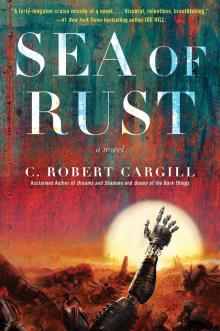 Sea of Rust
Sea of Rust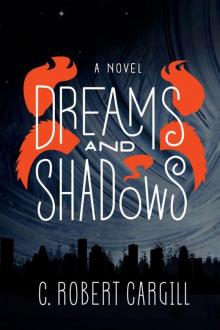 Dreams and Shadows: A Novel
Dreams and Shadows: A Novel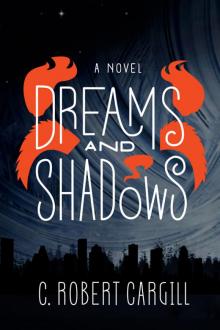 Dreams and Shadows
Dreams and Shadows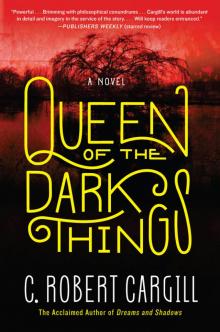 Queen of the Dark Things
Queen of the Dark Things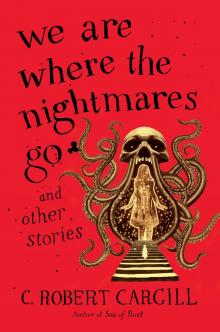 We Are Where the Nightmares Go and Other Stories
We Are Where the Nightmares Go and Other Stories